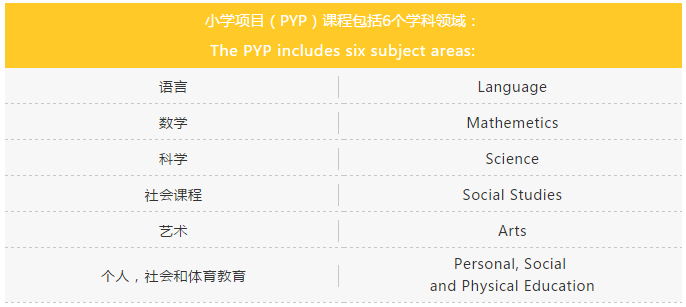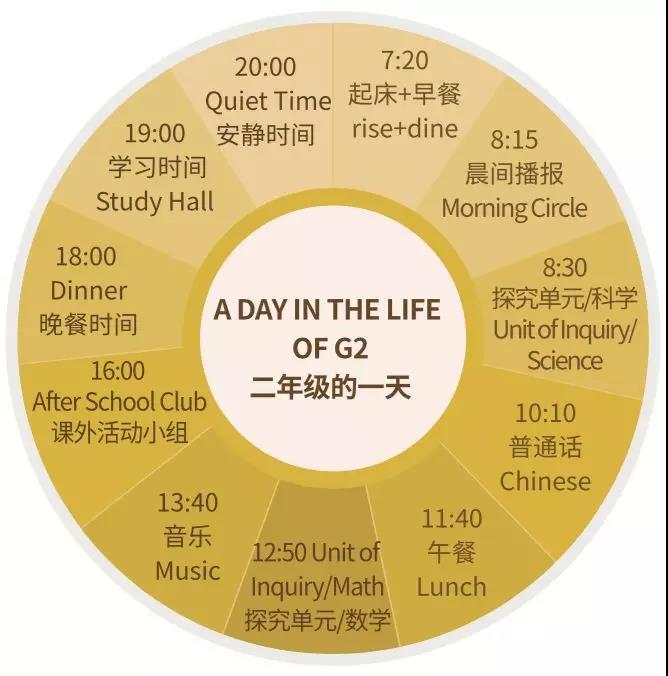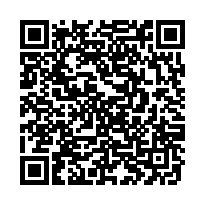小學課程 Primary School (IBPYP)

我們的小學為6到11歲的孩子提供跨學科框架下的小學課程。小學項目旨在讓孩子全面發展成為一個求知者,讓他們無論是在課堂中還是在外面的世界都充滿求知欲。
Our primary school serves children between 6 to 11 years under the transdisciplinary framework of the Primary Years Programme. The IBPYP is designed to develop the whole child as an inquirer, both in the classroom and the world outside.


二年級的一天 A Day In the Life of Grade2
7:20 起床吃早餐!
7:20 Rise and dine!
健康的早餐為美好的一天打下基礎。
A healthy breakfast sets the tone for the day.
8:15 晨間播報
8:15 Morning Circle
我們一天的學習從早間新聞播報開始,其中包括時事、慶祝活動或生日祝福。
We come together as a group to develop a classroom community and culture.
8:30 探究單元/科學
8:30 Unit of Inquiry/Science
國際小學項目(IBPYP)的定義元素是探究單元,這是一個6到8周的深入探索課程,它融合了傳統學科,如數學、語言、社會研究和科學的概念,以深入研究一個重要的、相關中心概念。
二年級一直在探討這個問題。如今,學生們正在研究稻草、木棍和磚塊的物理特性,以確定哪些特性使磚塊較適合建造房屋。
The defining element of the PYP is the Unit of Inquiry which is a 6 to 8- week in-depth exploration of a concept blending traditional subjects such as math, language, social studies and science to delve into a significant, relevant central idea.
G2 has been inquiring on the topic of Matter. Today, students are investigating the physical properties of straw, sticks, and bricks in order to determine what properties make bricks the material best suited for building a house.
10:10 普通話
10:10 Chinese
孩子們學習普通話作為母語或外語。根據本單元的要求,學生們正在用中文閱讀《三只小豬》。
Children study Chinese as mother tongue or additional language. In line with the Unit of Inquiry, students are reading The Three Little Pigs in Chinese.
11:40 午餐
11:40 Lunch
12:50 探究單元/數學
12:50 Unit of Inquiry/Math
在關于數學的探究單元中,學生們開始使用單幅單位比例尺的條形圖來收集和組織數據。
In connection with their unit on Matter, students begin to collect and organize data using bar graphs with a single-unit scale.
13:40 音樂
13:40 Music
墻壁也在美妙的音樂活了過來!我們的學生在錄音機里熱切地播放著“熱騰騰的十字面包”。
The walls are alive with the sound of music! Our students are eagerly playing ‘Hot Cross Buns’ in the recorder.
16:00 課外活動小組
16:00 After School Club
活動包括在創客空間建造機器人、踢足球、學習較新的尊巴舞步,或者在大富翁游戲中擊敗競爭對手。
Activities include building robots in the MakerSpace, playing a soccer match, learning the latest zumba move or outbuying competitors in Monopoly.
18:00 晚餐時間
18:00 Dinner
19:00 學習時間
19:00 Study Hall
是時候為明天的學習做準備了! 我們在完成家庭作業時盡了自己較大的努力了嗎?
It’s time to prepare our school stuff for another great day of learning tomorrow! Did we give our personal best in completing our homework?
20:00 安靜時間
20:00 Quiet Time
噓。。。廣播系統要播放一個很棒的睡前故事咯。是Mem Fox的《該睡覺咯》,還是Sterling和Rucker的《晚安,月亮》?
Ssshhh...the PA system is about to broadcast a great bedtime story. Would it be a Mem Fox's Time for Bed or Sterling and Rucker's Good Night, Moon?
(注意:這里使用的學生時間表示例僅用于說明。它不是對課程學習或活動時間表的真實描述。)
(NOTE: The student schedule example used here is for illustration only. It is not a description of the real schedule of course study or activities.)




 公眾號
公眾號






















 服務熱線
服務熱線
